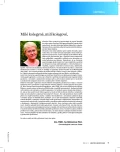-
Medical journals
- Career
Care integration – coordination barriers – aspects of integrated care – patients with complex needs – Czech Republic
Authors: M. Janečková
Published in: Geriatrie a Gerontologie 2018, 7, č. 3: 96
Category:
Overview
Background: Fragmentation of health and social care systems requires intense coordination among various stakeholders in order to provide continuity of care that reflects the needs of patients, especially those with complex needs. Almost two decades of trials to address problems of care fragmentation and poor outcomes for patients by policy makers and professionals in the Czech Republic have not lead to any substantial change in the way how care is provided. The objective of this study was to identify the barriers and opportunities to effective integration of health and social care for patients with complex needs in the Czech Republic as perceived by key stakeholders.
Methods: Mixed method research design was used. Literature review relating to topics of care integration/coordination from 2000 to 2016 was performed followed by 16 semi-structured interviews of key health and social care stakeholders that have been involved in the policymaking processes or have executive functions within the healthcare sector and 2 interviews with care recipients. The typology of P. Valentijn at al. was used to assess attitudes about 37 components of integrated care (IC) and their development in the Czech Republic.
Results: Mind map shows the major topics dealt by stakeholders as financing (130), change (96), (in)ability to cooperate (94), communication (86), participation (85), willingness to solve the problem (64), „silo-mindsets“ (47), healthcare insurance (45). The attributes of IC considered most important and the most developed in CZ are: trust (9,2/4,9), assessment of complex needs (9,1/4,1), team cooperation within one provider (8,6/4,7). The least developed aspects of IC in CZ are considered: joint health and social care strategy and financing (1,8;1,6), financing for care coordination (2,0), support for new models of care, change management, visionary leadership, sharing of information and use of communication technologies (2,5–2,9).
Conclusion: Separate systems of financing and legislation of healthcare and social care were considered to be the chief obstacle to effective health and social care integration. However, the main weakness of existing systems was poor communication, cooperation and fear of change among healthcare and social care stakeholders, silo-mindsets and particular interests that feed inability to reach a consensus on the macro level. However, positive experience (although limited) with care integration exists at the micro-meso level based on the proactive approach of local stakeholders.
Keywords:
Czech Republic – care integration – coordination barriers – aspects of integrated care – patients with complex needs
Sources
1. Nolte E, McKee M. Integration and chronic care: a review. In: Nolte E, Mckee M, eds. Caring for people with chronic conditions. Open University Press 2008.
2. World Health Organisation. People-centred and integrated health services: an overview of the evidence. Interim Report. Geneva: World Health Organisation 2015.
3. Janečková M, Vepřková R. Integrace péče – reflexe stavu v České republice. Výzkumná zpráva, 2017.
4. Kodner DL. All together now: a conceptual exploration of integrated care. Health Care 2009; 13 (Special Issue): 6–15.
5. Leutz W. Five laws for integrating medical and social services. The Milbank Q 1999; 77 (1): 77–110.
6. Valentijn PP, Vrijhoef HJ, Ruwaard D, et al. Towards an international taxonomy of integrated primary care: a Delphi consensus approach. BMC Fam Pract 2015; 16 : 64.
7. Válková M., Korejsová M., Holmerová I. Diskusní materiál k východiskům dlouhodobé péče v ČR. MPSV 2017. Dostupné z: www.mpsv.cz
Labels
Geriatrics General practitioner for adults Orthopaedic prosthetics
Article was published inGeriatrics and Gerontology

2018 Issue 3-
All articles in this issue
- Care integration – coordination barriers – aspects of integrated care – patients with complex needs – Czech Republic
- The analysis of the development of the number of home health care patients, hospitalized patients and clients of residential care facilities between 2000 and 2016.
- Antipsychotics prescription in Czech social care residential care facilities for seniors – results of DEMDATA study
- Neuropsychiatric symptoms of dementia and their management.
- Needs of senior patients in hospital care – analysis of Czech literature review results.
- The irreplaceable role of rehabilitation in geriatric patients at post-acute care centres.
- Geriatrics and Gerontology
- Journal archive
- Current issue
- Online only
- About the journal
Most read in this issue- The irreplaceable role of rehabilitation in geriatric patients at post-acute care centres.
- Needs of senior patients in hospital care – analysis of Czech literature review results.
- Care integration – coordination barriers – aspects of integrated care – patients with complex needs – Czech Republic
- Neuropsychiatric symptoms of dementia and their management.
Login#ADS_BOTTOM_SCRIPTS#Forgotten passwordEnter the email address that you registered with. We will send you instructions on how to set a new password.
- Career

